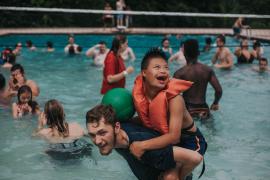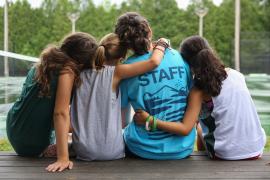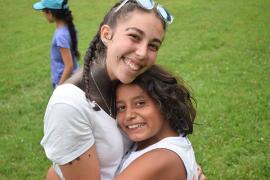I remember passing through the entrance leading to the summer camp where I was going to work for the very first time. I stopped the car, got out, and one of the directors came over and pointed at a person walking across the lawn. A quick “hello” and introductions were made between me and Susan, who turned out to be someone particularly important to my camp experience. That was when she and I found out we were to be co-counselors (co-cs). It was her tenth summer and my first.
The director’s arm then aimed in the general cabin area with a finger pointing to “Tamarack,” my home for the summer. I pulled up to the cabin to unload my stuff. When I opened the door, I could tell that Susan had already been there, as her things were tucked away in the set of drawers and her bed was made. We awkwardly shared small talk for the next few hours as we cleaned (there were spider webs everywhere) and got me unpacked and settled. While that was almost 40 years ago, I remember it as if it were yesterday.
Opening Up
The author’s experience of meeting her “co-c” upon arrival at camp is not uncommon. In other cases, camps make initial pairings in the midst of training or assign co-cs at the end of staff orientation. The sudden pairing with someone you don’t know can feel like being dropped into unknown territory. Trying to figure out who this other person is (or these people are, if more than two of you are teamed up) can seem rather daunting. No matter the number of co-cs on the team, you’ll want to know as much as possible about each other as quickly as you can. After all, the campers will soon arrive!
You and your co-c will fill many roles throughout the summer: you’ll be a “parent” to campers, logistics coordinator, facilitator, risk manager, instructor, role model, and much more. Regardless, your relationship with your co-c will be super important. A successful relationship between you will be dependent on learning each other’s strengths, preferences, and hot buttons, as well as communication and leadership styles. This requires open dialogue, listening skills, and sharing about yourself. What do you need to know about your co-c to have a great summer? What should they know about you? What is the important “stuff” to each of you? It will take some time and a willingness to learn — about your co-c as well as yourself.
Some camps will intentionally facilitate this process for you. During staff training you may be paired with different people and participate in a variety of activities. Those activities might be icebreakers or games, or setting up camp by organizing the dining hall, or putting together a modular dock. In addition to physical activities, leadership staff might assign you quiet activities, such as completing an interest/behavior inventory and then sharing that with your co-c to help you understand each other’s style preferences, recognize strengths, and appreciate differences.
Discussion topics might include basics such as knowing whether your co-c prefers a morning or nighttime shower or needs a cup of coffee before starting the day. You might also talk about camp songs, traditions, and ways to work with campers. In addition to a structured inventory, leadership staff might provide prompts for conversations, such as “share one important lesson that taught you something about yourself and what you learned.” Consider taking the initiative and engaging in such activities with your co-c on a regular basis during the camp season.
In any case, opportunities to learn about your co-c, and how they think, work, and communicate, can also be times that help you learn more about yourself. Understanding one another’s needs, preferences, and areas in which support might be needed will help to develop a strong and successful team.
The Match
A lot of thought typically goes into the matching process, and while it may seem random from the outside, if you could see the time, effort, and energy the leadership team goes through to find the right combination of staff for each camper group, you might wonder how the puzzle ever comes together!
Your camp may look at matching a new counselor with someone who is returning, consider preferences for working with particular age groups, and think about the experience and knowledge each person brings. To some degree, camp logistics come into play when determining counselor matches. For example, camp counselors who need the same day off for program or personal reasons shouldn’t be assigned as co-cs. Understanding the matching process can give you some insight into the intentionality that led to your chosen partner, which can serve as a foundation for relationship building.
Be careful to remain open-minded if you feel that you were “mismatched.” Trust the leaders making the assignments; they have knowledge of the big picture, while you only see a small snapshot. You may be surprised at how well the match actually works out.
Making Changes (or Not)
Camps have different philosophies about matching co-cs. Some keep the same staff match throughout the camp season while other camps change staff at the season’s midpoint or after every session. Though staffing structures are predetermined, changing circumstances can mean that co-c teams need to be adjusted. For example, a counselor may leave camp unexpectedly due to a family emergency. Or, if a cabin were damaged in a thunderstorm, it might be necessary to reassign co-cs. In other instances, senior staff may believe a change is needed in response to evolving camper concerns or unresolved struggles between co-cs. There might also be a time when a counselor, you or someone else, asks for a partner change.
While uncommon, you could reach a point where you feel that you and your co-c are no longer friends. If you feel like you’ve been left to figure things out on your own you might request a change to ease your discomfort. You might be tempted to ask that your co-c be moved or that you be reassigned; the opposite might also happen where your co-c asks to be moved to a different team.
As you might imagine, a change in any counselor match will cause a ripple effect — and campers will be affected. Campers and staff may take sides and express feelings of anger or sadness — all of which can be disruptive and have a negative effect on camp for the remainder of the season. Thus, senior staff will first encourage you to try and work things out.
The first step to that is understanding the underlying issues. Has communication broken down? Do the unpleasant tasks seem unfairly distributed? Have you discovered conflicting values? After listening to your concerns, leadership staff will likely ask how you’ve tried to resolve the issue. They may suggest additional strategies to try and offer a variety of supports to help you and your co-c work through your challenges. Learning how to work through unpleasant interpersonal situations will serve you well throughout your life.
Getting On the Same Page
Presenting a united front when interacting with campers is important for everyone’s well-being. You’ll find that your camp’s daily schedule and structure will determine some support elements. Camp operations will guide you as to when things are supposed to happen (e.g., wake up, mealtimes, program shifts). The how of facilitating these structural aspects of camp is generally left up to you and your co-cs. Consistency among the co-c team has a huge impact on a safe and enjoyable summer for all. Because people have different abilities at different ages, learning about the ages and stages of youth development can help you and your co-cs determine the most effective techniques to use with your campers. For instance, young campers require more rest than older campers; they also have a much lower capacity to understand the reasons behind rules.
Planning with Your Co-C
As you work with your co-c to support one another in your various roles with campers, look at planning from two perspectives:
- Which of you has the skills (interpersonal as well as execution) to do what is needed?
- What strategies can you agree on and put in place to help campers be successful?
Participating in open conversations (and revisiting topics) with your co-c about preferences, strengths, and areas to develop can help you decide who will take the lead when. Negotiating leadership roles for the less-than-exciting tasks (e.g., ensuring all campers take daily showers, counting children as they get on the bus) and being honest about the tasks you love and those you would prefer not to do will be important to strengthen your co-c team.
The second perspective for planning relates to the strategies you and your co-c can agree on to help campers have a good day, week, and session. Think about the routines that happen at camp daily. For instance, at an overnight camp you’ll need to consider the nitty-gritty aspects of starting the day. Some campers wake earlier than the “official” start time. What ideas might you and your co develop to help early risers remain quiet and not disrupt others? Establish rules for quiet activities (e.g., reading a book, writing in a journal, drawing pictures) and consistently and jointly apply them to help everyone enjoy the upcoming day.
Planning with your co-c before campers arrive about how your group will navigate daily events will present a united team and help avoid situations where campers play one counselor against another. Here are a few questions that might get you thinking and planning:
- What is important for campers to do before heading to breakfast (e.g., make the bed, shower, clean the cabin)? How will you and your co-c facilitate those activities?
- What manners will you focus on during mealtimes (e.g., saying “please” and “thank you,” moderating voice volume, proper ways to pass items)?
- How will you gather your campers off the bus, and what will you do while waiting for latecomers (e.g., play games, sing songs, create a group cheer)?
- What does rest time look like? Are campers relaxing on their beds or chatting in small groups? What activities can you suggest to use the time to help campers stay calm and regain energy?
- How will you assign roles to campers to help each other during the day? How will you decide who is the first in line? How will you choose partners for the buddy system in case a camper has to use the restroom or support one another during activities?
Regardless of who is leading or taking time off, it’s important to be on the same page with these and other daily routines so they will be seamless for campers. Figuring it out as you go can be a recipe for disaster, as campers won’t know what to expect or whom to follow. Not only will it be hard on camper adjustment, but figuring things out on the fly will also make it challenging for you and your co-c to find your rhythm. Jointly preparing ahead of time is the key.
Checking In with Your Co-C
Touching base with your co-c on a daily basis to see how things are going — how you feel about working together, how well you’re communicating, and if you’re presenting a united front — is important for success. Yet, finding time to do so in a private space can be tricky, so compare schedules as a first step to share observations and thoughts about how everything is functioning. This might mean you wake up a little earlier than the campers and meet in earshot of the cabin, walk back from lunch together, or sit down on the cabin porch after the campers are settled at rest hour. Mutually agree on a time and place based on the camp schedule and yours.
In addition to a daily check-in, get together with your co-cs weekly for longer conversations to help determine if you’re meeting each other’s needs as well as those of individual campers and the camper group.
Assess Collective SkillsAnswer the questions that follow individually, then compare your answers. Which of you (could be all or none) initiates or is best at:
|
Checking in with co-cs on a regular basis, openly, and with respect will highlight team strengths and provide guidance for making adjustments in ways that support each of you. During these chats, be sure to discuss how you’ll move forward if one or more of you tends to be the first to step up or tries to avoid certain aspects of navigating group life with campers. If you all are good at doing one or more of the activities in the preceding list, then your campers will benefit greatly from the co-counselor combo. If none of you are confident in an area, then join forces and make a conscious effort, or request coaching from leadership to ensure that you and your campers’ personal needs are met. Finally, genuinely sharing appreciation for your co-cs and responding to what each of you needs more/less of from one another will help your relationship stay intact.
Remember that while camp can be magical, positive partnerships don’t happen by magic — they require attention, planning, revisiting, and intentional action. You’ve chosen to work at camp and have already taken that first step to establish yourself as a member of a team with a common goal. Embrace your co-cs!
|
Discussion Starters: Think about the initial meeting with your co-c, and identify two things you could do to begin developing a strong co-c team. Name two of your personal attributes that will be important for your co-c to know to ensure a great summer for everyone. Describe your preferred methods for checking in with your co. Think about when, where, how, and what things you might want to touch base on — and then make it happen. |
Photo courtesy of Liberty Lake Day Camp, Bordentown, NJ.
Deb Jordan, ReD, is a professional educator who has been teaching and conducting trainings for 35+ years. She presents both in and outside the US and writes articles and books on leadership, programming, and staff development. Deb’s focus is on all things human: relationships, behaviors, thoughts, and attitudes. She facilitates learning on leadership/followership, group dynamics, diversity, equity, and inclusion, staffing, evaluation, and ethics. Deb is an accreditation visitor and co-coordinator of the ACA Research Forum. She can be reached at [email protected].
Kim Aycock, MST, equips emerging leaders with skills robots are unable to do. While blending the talents of a master teacher with the knowledge of a seasoned camp expert, Kim ignites learning for varying levels of camp pros worldwide through her interactive and innovative presentations. Kim speaks at regional and national conferences, contributes regularly to Camping Magazine, and serves as co-chair of ACA’s Staff Recruitment and Retention Committee/Staffing Summit. She can be reached via kimaycock.com.




